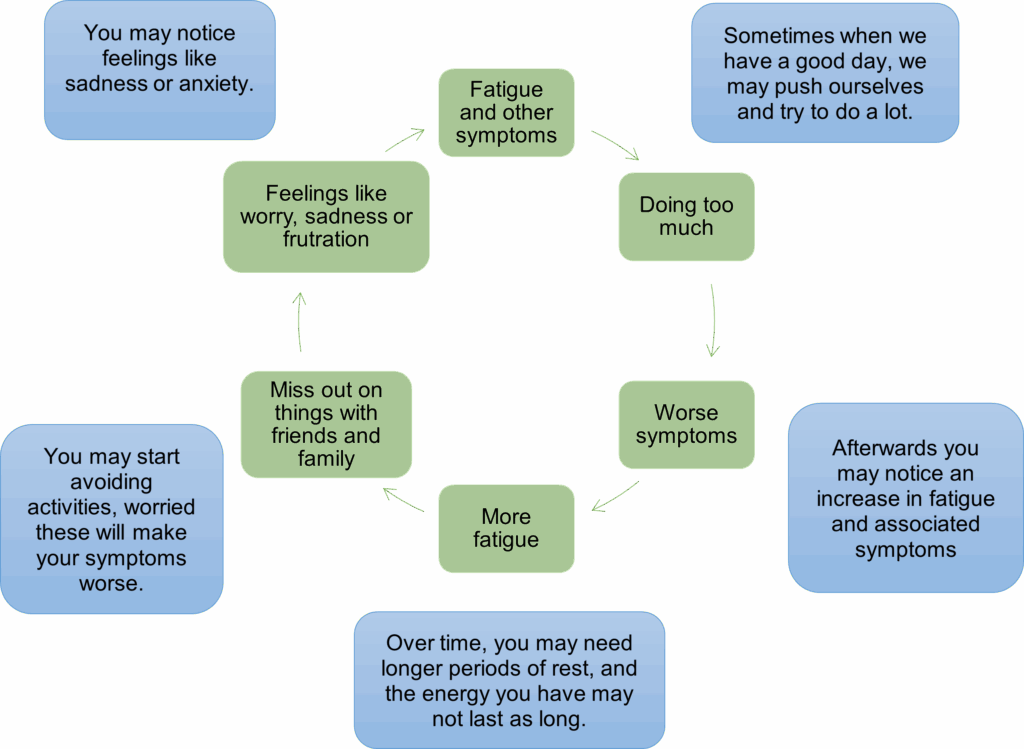On this page
It is normal to feel tired or drained sometimes, particularly after a busy day. For some people this feeling doesn’t go away even after a good night’s sleep and can stop you doing the things you want to do. This is what we call fatigue.
It’s not always easy to understand what causes fatigue, as it is a common symptom of many illnesses, both physical and psychological. Doctors might do lots of tests to try and find out what may be causing your fatigue.
What is fatigue?
Fatigue can look different for everyone. In addition to having little energy, it can be associated with lots of other symptoms. You may have some of the symptoms below, as well as some others. This is normal, and it’s important to try and make your own list of symptoms, including when and how strongly you experience them. This can help your medical team try and understand your experiences.
Symptoms
- Sleeping more or struggling with night time sleep
- Chills or feeling hot
- Feeling worried or sad
- Cold or flu symptoms
- Feeling dizzy
- Feeling sick
- Aches and pains
- Low energy
- Head aches
- Tummy aches
- Racing heart
- Feeling sensitive to light, noise or touch
- Sore throat
- Struggling to eat
- Struggling to remember things or concentrate
What happens to your body when you are fatigued?
Fatigue can often come and go. Some days you may feel better, and other days you may have lots of symptoms and little energy. The picture below shows a cycle of ‘boom and bust’ that can be common with fatigue.

What can help?
There isn’t a medicine which can help fatigue go away, but you can work towards feeling better! Your doctor may prescribe medicine for other symptoms. There are also things that you can do to help manage your energy levels better and help you to do some of the things that you enjoy.
Managing your energy
Energy can be used in different ways; physical activity is important to consider, but other less active things like schoolwork, reading, watching TV and socialising with friends will also use energy. Energy management involves learning how to use your energy to do the things you want to, within your energy levels.
Things to think about include:
| | Building in rest time Rest is very important when you have fatigue and should be both physical and mental rest. Activities such as scrolling on social media or playing computer games are physically less demanding but still use mental energy and are not the same as rest. Have a think about how you might rest during the day, trying to avoid going to sleep. Some people listen to calming music or do breathing exercises; it needs to be something that works for you |
| | Stopping before you get too tired Notice how long you can do different types of activities before you begin to feel fatigued. Ideally you need to stop before you start to feel fatigued, so that you aren’t using up all your energy. This can take some trial and error to get right but can help you to understand your energy levels. |
| | Planning your activity Plan the activities that you want to do throughout your week, making sure you include periods of rest. Think about keeping your activity levels consistent and within your energy levels. Planning like this can help avoid falling into a ‘boom and bust’ pattern, where you do too much at a time, increasing your fatigue. |
| | Managing how you feel Feelings such as sadness, anxiety, fear, frustration, or anger are very normal responses to having difficulties with fatigue. Dealing with these emotions can also be tiring and add to your fatigue. It can help to talk with someone you trust about how you are feeling. Writing things down can also help. |
Summary
This leaflet gives an overview of strategies to manage fatigue and other common symptoms.
Managing fatigue takes time and practice. Trying some of the strategies in this leaflet can help you over time. If you feel you need more support speak to your hospital team.
You may find it useful to look at some of our other leaflets about sleep, managing anxiety and managing low mood.
Patient advice and liaison
The Patient Advice and Liaison Service (PALS) can offer on-the-spot advice and information about the NHS and welcome your feedback on services. You can contact them on freephone 0800 032 02 02 or e-mail [email protected]
Useful websites
If you would like further information about health conditions and treatment options, you may wish to have a look at the NHS website at www.nhs.uk
If you would like to find accessibility information for our hospitals, please visit www.accessable.co.uk